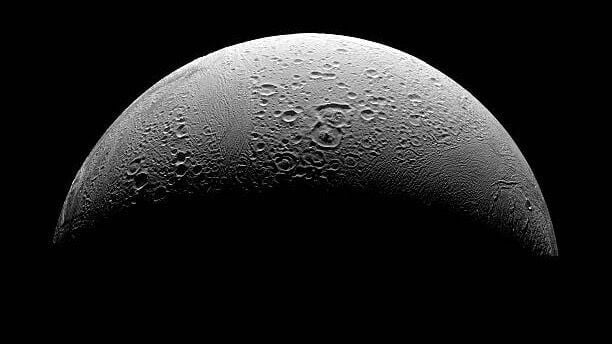New Delhi: Phosphate, a key building block of life, has been detected in one of Saturn’s moon’s, Enceladus’s, ocean, and in what scientists call the “first finding of phosphorus on an extraterrestrial ocean world”.
The phosphates were detected in particles ejected from the ice-covered global ocean of Saturn’s moon Enceladus, the international team of scientists led by the Freie Universitat Berlin, Germany, found using data from NASA’s Cassini space mission.
The team also found phosphate to be present in Enceladus’ ocean at levels at least 100 times higher than in Earth’s oceans.
The new discovery, published by a German-led international team of scientists, was based on a review of data collected by NASA’s Cassini spacecraft, the first to the planet, during its 13-year exploration of the giant planet, its rings and its moons from 2004 to 2017, and was published in Nature journal on Wednesday.
The scientists earlier found minerals and organic compounds in Enceladus’ ice grains excluding phosphorus- the least abundant of six chemical elements considered necessary to all living things ,and is found in the bones and teeth of humans and animals.
Phosphorus is fundamental unit of the structure of DNA and RNA and, a vital part of cell membranes and energy-carrying molecules existing in all forms of life on Earth.
Frank Postberg, the study’s lead author and a planetary scientist at the Free University in Berlin said, “It’s the first time this essential element has been discovered in an ocean beyond Earth.”
The scientists analysed through the data collected by Cassini’s Cosmic Dust Analyzer instrument, during its passing through a plume of ice crystals, and through the same material that feeds Saturn’s faint “E” ring with icy particles outside the planet’s brighter main rings. It confirmed the findings by undertaking laboratory experiments to infer that Enceladus’ ocean has phosphorus bound inside different water-soluble forms.
The new discovery made Enceladus – sixth largest among Saturn’s 146 known natural satellites – a potential option as a habitable place in the solar system beyond Earth, if only to microbes.
Over the past 25 years, scientists have discovered habitable places with oceans beneath a surface layer of ice in the solar system. These include Jupiter’s moon Europa, Saturn’s largest moon Titan, and Pluto.
“This key ingredient could be abundant enough to potentially support life in Enceladus’ ocean,” said co-author Christopher Glein, a planetary scientist at Southwest Research Institute in San Antonio, Texas.
However, scientists laid stress on the fact that the presence of phosphorus, and other key elements of life depict that such places like Enceladus are potentially habitable, not that is inhabited.






